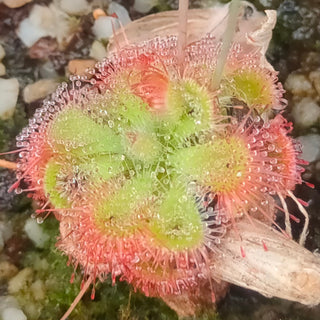Jacaranda mimosifolia
BLUE JACARANDA
- Unit price
- / per
Jacaranda mimosifolia is a sub-tropical tree that has been widely planted elsewhere because of its attractive and long-lasting violet-colored flowers. It is also known as the jacaranda, blue jacaranda, black poui, or fern tree.
The blue jacaranda has been cultivated in almost every part of the world where there is no risk of frost; established trees, however, tolerate brief spells of temperatures down to around -7 C (19 F). In the US, in areas where winter temperatures can dip to -12 C (10 F) for several-hour periods, the mature tree survives with little or no visible damage. Even when young trees are damaged by a hard frost and suffer dieback, they will often rebound from the roots and grow in a shrub-like, multi-stemmed form.
This plant has won the Royal Horticultural Society's Award of Garden Merit.
The tree grows to a height of up to 20 m (66 ft). The flowers are up to 5 cm (2.0 in) long, and are grouped in 30 cm (12 in) panicles. They appear in spring and early summer, and last for up to two months. The blue jacaranda is cultivated for the sake of its large compound leaves, even in areas where it rarely blooms. These leaves are up to 45 cm (18 in) long and bi-pinnately compound, with leaflets little more than 1 cm (0.39 in) long.
The unusually shaped, tough pods, which are 5.1 to 7.6 cm (2 to 3 in) across, are often gathered, cleaned and used to decorate Christmas trees and dried arrangements.
Hardiness zones: 9-11
Seeds per packet: 10
Before planting, soak the seeds for 12 hours. Sow just under the surface of the soil and water in. Keep lightly moist. Temperature 21C (70F). Seeds germinate in 30-60 days.
Jacaranda mimosifolia
BLUE JACARANDA
- Unit price
- / per
Multiple secure payment options available.
Adding product to your cart
You may also like
Jacaranda mimosifolia is a sub-tropical tree that has been widely planted elsewhere because of its attractive and long-lasting violet-colored flowers. It is also known as the jacaranda, blue jacaranda, black poui, or fern tree.
The blue jacaranda has been cultivated in almost every part of the world where there is no risk of frost; established trees, however, tolerate brief spells of temperatures down to around -7 C (19 F). In the US, in areas where winter temperatures can dip to -12 C (10 F) for several-hour periods, the mature tree survives with little or no visible damage. Even when young trees are damaged by a hard frost and suffer dieback, they will often rebound from the roots and grow in a shrub-like, multi-stemmed form.
This plant has won the Royal Horticultural Society's Award of Garden Merit.
The tree grows to a height of up to 20 m (66 ft). The flowers are up to 5 cm (2.0 in) long, and are grouped in 30 cm (12 in) panicles. They appear in spring and early summer, and last for up to two months. The blue jacaranda is cultivated for the sake of its large compound leaves, even in areas where it rarely blooms. These leaves are up to 45 cm (18 in) long and bi-pinnately compound, with leaflets little more than 1 cm (0.39 in) long.
The unusually shaped, tough pods, which are 5.1 to 7.6 cm (2 to 3 in) across, are often gathered, cleaned and used to decorate Christmas trees and dried arrangements.
Hardiness zones: 9-11
Seeds per packet: 10
Before planting, soak the seeds for 12 hours. Sow just under the surface of the soil and water in. Keep lightly moist. Temperature 21C (70F). Seeds germinate in 30-60 days.
You may also like
You may also like
Recommended Products
CUSTOMERS ARE ALSO BUYING THESE
Testimonials
Here's What Some Of Our Customers Had To Say (Thank you!)

First time ordering last year! WoW1
I started ordering seeds from this company a year ago... all the seeds germinated which i cant say about other seed companies' They also have a great selection of usual seeds and old time seeds which i love.

I got these pretty quickly and in perfect order. I can't wait to see what they look like once I plant them. I have another colour and they were so pretty I had to try these. I have used this seller a few times now with great success, and will again. Everything I have ordered has been of good quality!

Ferri Seeds is truly a wonderful company. They take the utmost care when delivering your seeds. Mine arrived promptly and when I had any questions, they were so happy to help me. I am looking forward to getting more from them soon. Thank you David for making this a delightful experience.

Never grew coleus from seed, and it was surprisingly easy. They germinated quickly on my heat mat and grow lights. Can't wait to see them in the garden!

Great product ! All seeds germinated and flourished nicely.

I was impressed with Ferriseed’s selection of seeds. Ordering was a breeze and the seeds arrived in a perfect little padded envelope in 9 days. I am very happy and will order from here again. Many thanks.

Fantastically seedlings. They were well packaged. I planted them right away and they’re growing nicely so far.

We placed our order on Thursday and received it on Monday. Here in Canada the tracking link is accurate. Ferri seeds tells you when they're shipping and when your order is delivered, the seeds arriving in excellent condition. We will definitely be ordering again this spring. Keep up the good work!

My order, made late afternoon, April 27th, and needed in a bit of a rush, was mailed next morning and arrived in my rural mailbox in BC, May 5th.
Thank you for your cheerful, friendly emails and prompt service. I certainly recommend you others and will be sure to keep an eye on the range of seeds you offer in future.

Gt the delivery on time. One week since i potted the seeds. Some of the seeds are already sprouting so i am very happy so far. No complaints yet

Fast shipping, good packaging, instructions included. They have germinated!

Thank you Ferri Seeds for the timely shipments of seeds I ordered. I have been looking to replace that plant for years.

Excellent service, (fastest!!) Great packaging. Also very appreciated is all of the information on how to 'deal' with perennial seeds! Will order again!! Thank you

The seeds came just as described. I appreciate the good follow-up to my questions also.

Fast service, amazing communication!

I happened across Ferri Seeds website when I Googled a particular plant I’d been looking for. I was impressed by their selection of all types of seeds and their good product descriptions along with detailed germination instructions. I found the site and ordered on a Saturday. On Sunday I got a notice that my order had been shipped! The seeds were in my P.O. box on Friday. Such amazing service. It’s too early to comment on germination rates — I’ve just started the stratification process today.

Received in 1-2 weeks in Canada, Ontario. Everything is as ordered. No issues. Ordered through the official web site.

I have ordered multiple selections of seeds all with great germination rates. One order never arrived and they promptly sent a replacement no questions asked. I definitely recommend serious gardeners to check this site out.

The Japanese anemone seeds arrived promptly. Thank you Ferri Seeds!!

Customer service excellent. Was able to order streptocarpus seeds. Hard to find.

Thank you for having showy Asters., Birdsnest Delphiniums and Colbalt Delphiniums and Obedient plant seeds in Stock. My butterfly garden is almost now complete. And I am cold stratificationing the seeds.

I had a herbarium project with a short deadline. Ferri Seeds were professional, friendly and sent me Alstroemeria seeds promptly. The seeds arrived in a protective sleeve within a letter envelope. The herbarium is complete! I highly recommend Ferri Seeds! Thank you!

Very good seller!

Very satisfied, quick service

It's been a pleasure dealing with Ferri Seeds!

Ferri Seeds – one of the best online and most helpful businesses I have ever had dealings with. Quick turnaround, dispatch, and beautifully packaged seeds. What more could you want – beautiful flowers would be nice. Well I am sure they will turn out to be.

The seeds were received fairly quickly, considering they came from Canada. Cost of the seeds versus the quantity is fantastic.

Amazing selection. Fast service. I look forward to ordering in the future.

I had made an error with the adress and upon getting the order back from the post they contacted me and even agreed to send it to a new address without extra charges.
Honestly this kind of service is rare these days.
Thank you to the team of Ferri Seeds, rest assured I will be purchasing from this vendor again.
I was very impressed with my order and the service I got from this company. I will order from them again.

1. It's Canadian!!
2.Interesting variety of seeds that are sometimes hard to acquire.
3.Prompt acknowledgement of orders and speedy delivery...

Delights to deal with! I had questions regarding the germination instructions of my first package of their seeds. Their customer service was exceptional! Clear instructions, lovely people! I've since ordered several sets of seeds!

Ferri Seeds offered a hard to find seed on their website. I placed the order but had questions about product and delivery. Customer service contacted me right away. My questions were answered right away. I was kept updated on delivery progress. The seeds were exactly what I wanted. My husband is a very serious gardener. I will do more business with Ferri.

I made a mistake with my address and they changed it right away when I let them know. I like that they ask you to check to see if everything is correct.

I ordered seeds, but provided wrong mailing address. I emailed them back and they re-send me same seeds without extra charge. Grate customer service.

Thank you Ferri for your quick response in addressing my error in ordering! I really appreciated it.

Easy to navigate selection is great prices are reasonable you won me over I will be coming back

Very fast I am excited
We carry a diverse selection of seeds from around the world, many are rare and hard to find!
Regular new seed stock, special cold/dry storage facility, and record keeping ensures our stock is fresh and ready to grow for you.
We welcome your contact. We reply the same day or next business day with a friendly and personalized answer to your inquiry!
When you sign up, you are agreeing to receive promotional emails and other marketing communications from us. In the future, you can always unsubscribe.


